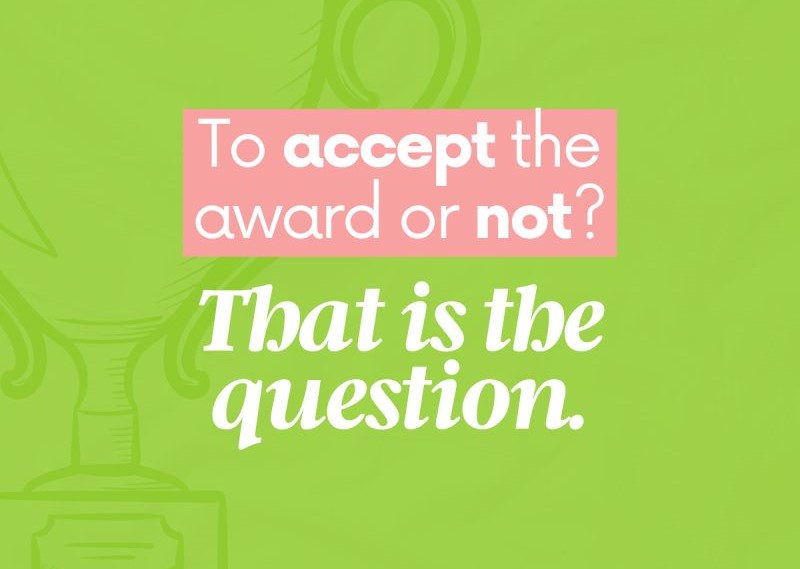
To Accept the Award or Not: Protecting Your Personal Brand
A couple of months ago, our Co-Founder/Managing Director was invited to nominate herself for the Co-Founder/Managing Directors Award. This got us thinking: should she accept this, or is it one of those ‘oddly specific’ and potentially meaningless accolades?
If you’re a business leader or a personality with some recognition in your space, you’ve probably received an invitation like this. And, with “awards” from obscure companies popping up like mushrooms over the past few years—especially as these projects have become veritable money earners—chances are, you’ve seen quite a few of them. The reality is that business awards have proliferated—particularly in the Middle East, where the growth of such initiatives reflects both the region’s economic expansion and the global trend of awards as a business model.
But here’s the real question: Just because you’ve been approached for an award, does it mean you should accept it? Let’s take a moment to consider the implications.
Just because you’ve been approached for an award, does that mean you should accept it?
The Growth of Business Awards in the Middle East
In recent years, the Middle East has experienced a notable surge in business awards programs. This trend reflects both the region’s dynamism and the global expansion of awards as a profitable business venture. From local initiatives to regional and international awards, the options for recognition are endless.
Awards as a Business Model
Let’s take a moment to acknowledge that awards programs have also become a highly lucrative business model. They often operate on principles designed to maximize revenue:
- Paid nominations with the promise of exposure to encourage participation
- Revenue generated through “winner’s fees” or packages that grant recipients exposure and recognition
- Networking events that double as PR and sponsorship opportunities
- Awards ceremonies that feature high-profile attendees, such as government officials and business elites
While this model provides financial incentives for organizers, it also raises questions about whether all awards genuinely recognize merit or simply act as a revenue stream.
The Benefits of Participating
Despite the concerns, many individuals and companies participate in these awards for the benefits they offer:
- Recognition: Being shortlisted or winning provides a stamp of credibility in a competitive market.
- Networking: Awards ceremonies offer opportunities to connect with industry leaders and potential clients.
- PR and Marketing: Awards create visibility, enhancing brand perception and trust.
- Employee Morale: Recognition can serve as a motivational tool, boosting team morale and company culture.
In the Middle East, where business relationships and reputation are paramount, receiving an award can be a key to building trust and credibility. In this region, awards carry significant weight, especially when they attract government officials, royalty, and top industry players.
Challenges and Criticisms of the Awards Industry
However, the proliferation of awards has led to growing skepticism. It’s true—awards can boost visibility, build thought leadership, and enhance your prestige and reputation. They can set you apart in your field, position you as an expert, and open doors to new opportunities. But—not all awards are created equal. An award is only as valuable as the reputation of the award-giving body, and not every recognition is worth the potential risk to your personal brand.
In the Middle East, where business awards have rapidly expanded, the sheer volume of programs has led to several concerns:
- Oversaturation of the Market: With so many awards being handed out, the significance of any one award may diminish. The abundance of new programs dilutes the value of recognition, making it difficult for recipients to differentiate between truly prestigious honors and those that are just looking to capitalize on the lucrative trend.
- Credibility and Judging Transparency: Many awards programs lack clear or credible judging processes, raising questions about the legitimacy of the recognition. When awards appear to be distributed arbitrarily or based on superficial criteria, recipients may risk associating their brand with an organization that lacks integrity.
- Revenue-Driven Awards: A growing number of award programs operate as profit-driven businesses, where winners are expected to pay high fees for plaques, trophies, or packages to “celebrate” their win. This commercialized approach shifts the focus from genuine recognition to revenue generation, which can tarnish the award’s authenticity. In extreme cases, participants may feel that they are essentially buying recognition, rather than earning it.
- Misalignment with Brand or Values: Accepting an award that doesn’t align with your achievements or brand positioning can backfire. For instance, receiving an award for global impact when you’ve only operated locally may raise eyebrows among your peers and clients. Such misalignment can create the impression that you’re chasing accolades for visibility rather than for genuine accomplishments.
In today’s world of digital connectivity and heightened skepticism, your personal brand is everything. Accepting an award from a body that lacks credibility or prestige could do more harm than good. It’s not just about whether the award looks good on your shelf or LinkedIn profile; it’s about what it says to those who matter most—your clients, your partners, your peers. Your personal brand’s integrity is at stake.
Not all awards are created equal. An award is only as valuable as the reputation of the award-giving body.

Protecting Your Personal Brand: Things to Consider
As much as awards can build visibility, thought leadership, and reputation, they can also pose a risk to your personal brand if approached without discernment. Here’s what to consider before accepting that shiny trophy:
- Reputation and History of the Award-Giving Body: Does this organization have credibility? Is it respected within your industry or region?
- Previous Winners: Are the previous recipients respected leaders in their field? Or do they seem obscure or out of sync with your achievements?
- Alignment with Your True Achievements and Values: Does this award genuinely reflect what you’ve accomplished? Or is it a forced recognition that doesn’t quite fit your narrative?
- Opportunity to Leverage it for a Greater Cause: Can you use the award to drive a larger purpose or make a meaningful impact in your industry?
- The Cost of the Award: Is there a steep “winner’s fee” attached? Awards that require hefty payments may be more about money than merit.
Protecting your brand sometimes means passing on opportunities that don’t add real value.
Illustrado’s Take: When to Say No
At Illustrado, we believe in the power of authentic recognition. However, not every award is worth accepting. In fact, sometimes the smartest move you can make for your personal brand is to simply say “no.”
If the award doesn’t align with your values, achievements, or long-term strategy, it’s better to decline and protect your personal brand’s integrity. Awards should be about celebrating genuine accomplishment, not paying for a title.
The bottom line? Protecting your personal brand sometimes means passing on opportunities that don’t add real value. The next time you’re approached for an award, take a moment to consider whether it truly enhances your brand—or whether it’s just another shiny object that could dull your hard-earned reputation.

